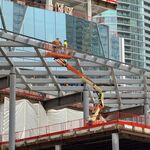Fresco
Active Member
/https://www.thestar.com/content/dam/thestar/news/canada/2019/03/21/dirty-money-is-driving-up-toronto-real-estate-prices-report-says/tk20160620_884.jpg)
Dirty money is driving up Toronto real estate prices, report says
More than $20 billion in anonymous money was used to purchase tens of thousands of homes in the GTA.
Dirty money is driving up Toronto real estate prices, report says
Toronto’s real-estate market welcomes criminals, giving them an easy way to invest dirty money and driving up housing prices for regular people, according to a report published today by Transparency International Canada.
“Our laws and regulations are full of cracks that can be exploited by criminals, and they appear to be doing so in growing numbers,” the report says. “Domestic criminals have known for decades that Canada is ‘la la land’ for financial crime, but word has spread internationally too. … Canadian real estate has attracted the attention (and money of dubious origin) of corrupt government officials and organized crime syndicates from across the globe.”
In the federal budget released this week, the government announced measures to combat money laundering through property in British Columbia, but ignored the Toronto market.
Transparency International Canada studied all residential property transactions in the GTA since 2008 and discovered more than $20 billion in anonymous money entered the real estate market without any oversight or due diligence.
During this period, more than 50,000 homes were purchased by corporate entities, which can easily hide their real owners behind straw men directors — people paid a nominal fee to put their name on corporate documents. More than two-thirds of the money used to buy these residences came from untraceable sources: $9.8 billion was in cash and $10.4 billion was in the form of mortgages from unregulated lenders, which aren’t subject to anti-money laundering reporting rules.
“A worrying amount slips past regulators who don’t really know who owns what, nor how much is being used for money laundering and tax evasion,” states the report, titled “Opacity: Why criminals love Canadian real estate (and how to fix it).”
“For individuals looking to buy real estate undetected, corporations are extremely effective camouflage. Companies can register title to property in Ontario without disclosing any information about their directors, owners or even their country of registration. All that needs to be disclosed is the company’s name and an address — a post-office box or a lawyer’s address will suffice.
“In cases where the company cannot be located, it is practically impossible for the police or tax authorities to investigate suspicious activity,” states the report.
While it’s impossible to quantify how much dirty money has been invested in the property market, and to what extent that criminal activity has driven up housing prices, the report states “it is clear that real estate is attractive to criminals with money to launder, and basic economics suggests that prices increase in response to added demand.”
Average housing prices in the GTA have more than doubled in the last decade, and the impacts have been felt far and wide: Condos sit empty, or are rented out night-by-night on Airbnb, contributing to a shortage of rental housing. Rising prices push workers out of the city and large mortgages have driven household debt to record levels, according to Statistics Canada.
The Star has reported extensively on how Canada has developed a reputation as a tax haven and a destination for dirty money. In the Panama Papers, Canadian companies were sold by the now-defunct law firm Mossack Fonseca as vehicles to avoid tax.
This activity was facilitated by a large number of loopholes in Canada’s anti-money laundering rules. Getting real estate professionals to comply with the law has also been a challenge.
A Star investigation published last year revealed that Canadian real-estate agents submitted suspicious transaction reports in less than 0.008 per cent of property sales made between 2013 and 2017.
“While the proceeds of crime can be laundered through any strand of the economy, there are several characteristics of the real-estate sector that make it particularly attractive for money laundering,” states the report, listing “weak regulation, lax enforcement, and the ability to hide in plain sight through anonymous ownership structures.”




